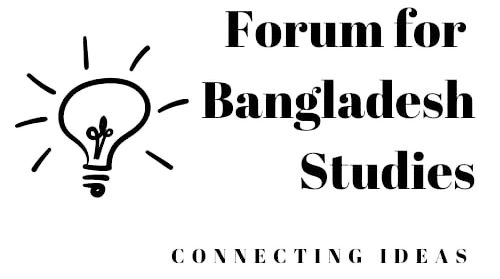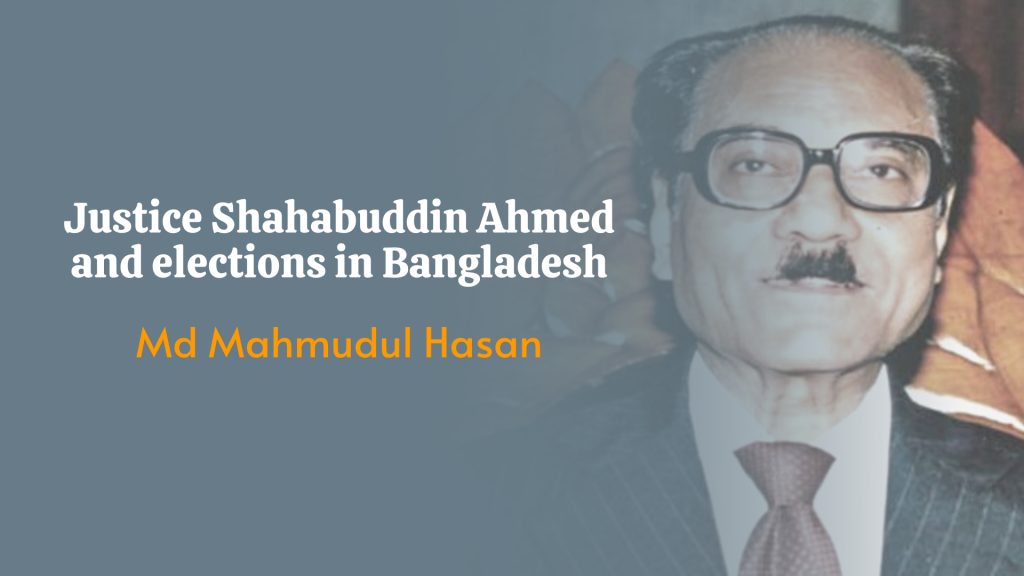A few years ago, I read in the news that president justice Shahabuddin Ahmed was in poor health — both physically and mentally. It was specifically reported that he was having some mental health issues. I was sad to know about the ill health of this great servant of the nation. Since then I had been on the lookout for any news about our former president and chief justice.
On March 19, I came across a piece of breaking news that he is no more. Inna lillahi wa inna ilaihi rajiwoon (definitely, we are for Him and to Him shall we return).
I have been in profound admiration for Shahabuddin Ahmed since the 1991 general elections in Bangladesh. I was then under the voting age so did not cast a ballot in that election. However, I witnessed with deep interest how it was conducted and how Shahabuddin Ahmed presented the country with an historic, unquestionably fair and free election.
How did he achieve that?
On election day (February 27), the law enforcement agencies didn’t have to apply much force to ensure the smooth running of the poll. It was done beforehand. In the run-up to election day, the caretaker government of Shahabuddin Ahmed conducted a comprehensive and effective public relation campaign throughout the country. It made use of all administrative machineries and available media to inform and educate people on election matters on a mass scale.
The public received a very clear and unambiguous message that the government would do everything to ensure a free and fair election and that any vote rigging or voting irregularities would be sternly punished. All these created an admirable climate of democratic openness and high hopes. At the same time, these also triggered an atmosphere of alarm in the minds of potential perpetrators of vote rigging. A sense of fear was instilled in the minds of those who would otherwise break the law or abuse the electoral system. All understood that any fake or counterfeit voting would be dealt with firmly.
In the weeks leading up to election day, the whole country experienced stability and democratic transformation. Everybody realised that it would not be an election that they had seen in the country before. The hooligans and party musclemen who were in the habit of causing anarchy on election days got the right message at the right time. Accordingly, they didn’t sharpen their weapons the previous day. Nor did they contemplate occupying polling stations, snatching ballot boxes or stuffing ballot papers in the ballot boxes. No election officials were taken as hostages.
On election day, everything was set in order, and everything ran smoothly. I don’t remember hearing incidents of any anarchy or killings in the run-up to, during or after the election.
I have long pondered on the election strategy of Shahabuddin Ahmed. The conclusion I have drawn is that, much of the work to ensure a free and fair election needs to be done before election day. In order to prepare the people of the country for election, the government needs to equip them with information, admonition and warning.
How does this translate into my profession?
As an educator, I have to conduct election-like events on a regular basis. My students have to sit for class tests, examinations and other organised assessment events where my role is comparable to that of an election commissioner. In this respect, in some way, what I had learnt in 1991 from Shahabuddin Ahmed’s handling of the election has been guiding me in the administration of my students’ tests and examinations.
Taking cue from Shahabuddin Ahmed, I explain in clear terms to my students the dos and don’ts well ahead of the actual tests or examinations. I make sure that my students are fully aware of the consequences they will face if they try to cheat in the exam, copy from others or commit any other unlawful acts.
Most importantly, I make it very clear to them that I want to conduct a class test or examination where no cheating will be tolerated. I persuade my students that in their examination scripts, everybody should get what they deserve. I also assure them that this is not the only class test that they would face in their lifetime. If they can’t do well in this, there will be a series of many more examinations where they will have the opportunity to demonstrate their learning abilities. So to obtain a higher grade they actually do not need to use dishonest or devious means.
My success rate in arranging effective and fair examinations is very high. The lesson that I had learnt in 1991 has been playing a big role in my administration of class tests and examinations. At the micro level, I remain grateful to Shahabuddin Ahmed for the lesson that I derived from his administrative and leadership role.
At the macro level, Shahabuddin Ahmed’s standing as justice and his superior statesmanship gave us hope and optimism in 1991 and afterward. We gained confidence that as a country we would be able to tread the path of democracy with honesty and professionalism.
Unfortunately, it didn’t take long for us to be disillusioned. Our election is now a farce and our democracy, a sham. Our daytime election has now morphed into a nocturnal event.
In one sense, it was good that, during the worst of our election practices, because of his poor mental health, Shahabuddin Ahmed was perhaps not in the right mind to understand what was happening in the country. He may not have fathomed the extent to which we have devastated our democratic credentials.
Unlike in 1991, I am now eligible to vote. But the question is: Are there free and fair general elections in my country?
On a final note, I am not very sure when our country will see another February 27, 1991 election that set a historic record of fairness under the watch of Shahabuddin Ahmed. In order to treasure the moment of democratic exhilaration that all of us experienced on that day, can’t we declare it the Day of Democracy in Bangladesh? I believe that will be a great way to pay tribute to Shahabuddin Ahmad for what he contributed to our country and to our democratic life.


I was just born in 1991, so the entire process of the election held on 27 February 1991, i came to know only through the reading and experience shared by the witnesses. By doing so i came to learn that the election of 1991 was so far the best election in the history since independence. I was eligible to cast vote for the first time in 2010, since then the country hadn’t been able to see any election, which can provide me the scope to exercise my constitutional right any more. The country was made me unable to cast my vote any more. Moreover, its a very miserable experience of mine had to maintain duty as assistant presiding office in the election held 2018, which was basically held the night before. The experience I gathered during these days will be alive for long time in my mind. Since then the speech of the states person seems very lame to me and when I heard them i got astonish how can a person be so brazen!
I was just born in 1991, so the entire process of the election held on 27 February 1991, I came to know only through the reading and experience shared by the witnesses. By doing so I came to learn that the election of 1991 was so far the best election in the history since independence. I was eligible to cast a vote for the first time in 2010, since then the country hadn’t been able to see any election, which can provide me the scope to exercise my constitutional right any more. The country made me unable to cast my vote any more. Moreover, it’s a very miserable experience of mine had to maintain duty as assistant presiding officer in the election held 2018, which was basically held the night before. The experience I gathered during these days will stay alive for a long time in my mind. Since then the speech of the states person seems very lame to me and when I hear them I get astonished how can a person be so brazen!